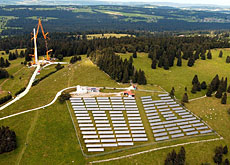Renewable energy attracts investors

Investors are increasingly discovering that there is money to be made from climate change.
Last year they poured SFr18 billion ($14.8 billion) into sustainable investments in Switzerland – an increase of 70 per cent over 2005. This impressive growth mirrors the boom in companies active in environmental technology.
Meyer Burger and 3S Swiss Solar Systems, both based in canton Bern, are two companies that have embraced the sustainability ideal.
3S is world market leader in the production of manual and semi-automatic solar panels while Meyer Burger produces specialised machines for cutting hard, brittle material used primarily in solar power technology.
Both companies were very successful last year. Meyer Burger’s earnings doubled to SFr5.6 million, with its turnover up 40 per cent to around SFr83 million. The company share price has risen nearly 200 per cent since its launch on the Swiss exchange in November.
For its part, 3S saw black for the first time, making a SFr700,000 profit and almost trebling its turnover to SFr11.6 million. The company’s share price has gone up 35 per cent.
Measuring success
One way to measure success is by the increase in the number of jobs created.
Meyer Burger corporate communications officer Werner Buchholz said the number of staff on the company’s payroll rose by 97 to 284. The number of employees at 3S almost doubled, from 22 to 42, general manager Patrick Hofer told swissinfo.
The Meyer Burger and 3S success stories are not unique, and a growing number of private and institutional investors are setting their sights on the sustainability sector.
“They have realised that you can earn a great deal of money in this area,” said management consultant Daniel Muntwyler from Sustainable Asset Management (SAM).
Urs Holliger, a member of the executive management at Ethos, the Swiss Foundation for Sustainable Development, points out the need to take greater account of social factors when looking at production methods, for instance checking whether a company adheres to good business practice or uses child labour.
He says sustainable investments are not just a trend, but are becoming standard practice. “There is good reason for the increase, as sustainability makes sense,” he said.
Risk
But strong growth also entails some risk. “Unbridled growth can lead to losses for investors,” Muntwyler warned.
He says it is certain that sustainable companies will be overvalued on the market, as happened to internet companies prior to the dotcom crash in 2000. But he expects this to be short-lived.
Companies should face risks by adopting sensible strategies, Muntwyler advised: “One must really see whether the high rate of earnings margin can be maintained.”
Muntwyler says sustainable investments have proven their worth. He cites the example of Germany where a combination of start-up financing for alternative energy and an advantageous tax system have created around 50,000 jobs in recent years.
Swiss under pressure
This drive in Germany – which the European Union has copied – has put pressure on Swiss firms, particularly in the solar energy industry.
“Ten years ago the Swiss were market leaders but now they have fallen behind and it is German companies that are exporting their technology to, for example, China,” the SAM expert said.
But Swiss companies are now moving in the right direction. The CO2 tax on fuel, which Muntwyler expects will be introduced in 2008, and the recent U-turn in parliament have further boosted the solar energy industry.
swissinfo, adapted from a German article by Renat Künzi
Sustainable investments grew five times as much as the total Swiss funds market.
Investment consulting and research company onValue carried out a study among 21 Swiss providers of sustainable investment products.
These are managed according to ecological, social and ethnical considerations.
Shares make up the bulk with 77% of the total, followed by bonds at 10%, private equity (around 3%) and liquidity (1.3%). 8.5% was not defined.
The SFr18 billion investments in sustainable energy companies constituted just 2% of the total in 2006.
In Switzerland, there are no figures relative to new jobs created by climate change.
Solar and wind power are among the “new” renewable energy resources.
Solar energy counts for 0.03% of the Swiss electricity production, while the percentage for wind energy production is even lower.
Hydroelectricity is the traditional source of renewable power production, making up 60% of the country’s electricity needs.

In compliance with the JTI standards
More: SWI swissinfo.ch certified by the Journalism Trust Initiative











You can find an overview of ongoing debates with our journalists here . Please join us!
If you want to start a conversation about a topic raised in this article or want to report factual errors, email us at english@swissinfo.ch.